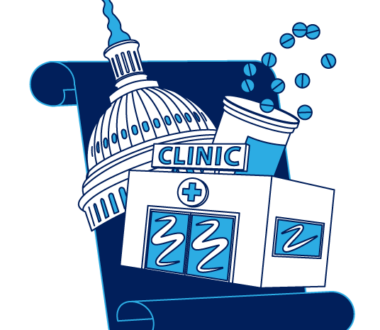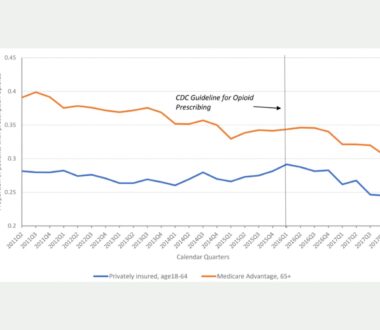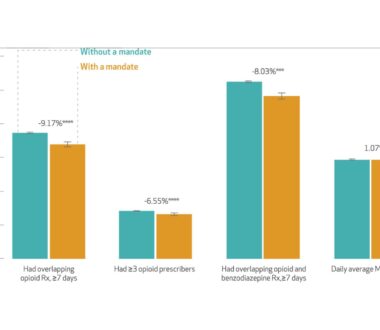
Initiation of Hepatitis C Treatment Low Among Medicaid Recipients
While there are highly effective treatments for the hepatitis C virus (HCV), only 1 in 5 Medicaid enrollees diagnosed with HCV started treatment, according to a retrospective study led by researchers at Weill Cornell Medicine and Cornell University’s Ithaca campus. The findings revealed that treatment uptake rates were even lower among people under 30, women, […]

Dr. Yuhua Bao Receives Grants to Study Implications of Opioid and Other Drug Policies on People with Cancer
Dr. Yuhua Bao, professor of population health sciences in the Division of Health Policy and Economics, has received grants from the American Cancer Society (ACS) and the National Cancer Institute (NCI) to assess the implications of opioid and other drug policies for patients receiving active cancer treatments, long-term survivors of cancer, and cancer patients with advanced disease. “Both studies are motivated by the […]

New Federal Rules That Lower Barriers to Opioid Care Could Save Thousands of Lives
The two main medications that treat opioid use in the United States reduce overdose deaths by 50%. Yet fewer than one in 10 people with opioid use disorder (OUD) can access this kind of medical protocol, according to the Centers for Disease Control and Prevention (CDC). Fortunately, a new law and a new federal regulation […]

Evidence for Supportive Prenatal Substance Use Policies
Increased prevalence of illicit substance use during pregnancy in the past decade has renewed national attention to prenatal substance use policies (PSUPs). Currently, there are punitive policies that criminalize drug use during pregnancy or define prenatal substance use as child maltreatment in child welfare statutes. If newborns are found to have prenatal exposure to substances […]

Robust Prescription Monitoring Programs and Abrupt Discontinuation of Long-term Opioid Use
Prescription drug monitoring programs (PDMPs) are statewide databases that track controlled substances dispensed at retail pharmacies. Used by health care providers, public health officials, and other stakeholders, PDMPs have become a major tool in addressing unsafe opioid prescriptions. Robust features of PDMPs—including mandates that allow prescriber use of PDMP, data-sharing across states, and prescriber delegation of […]

Prescription Opioids Dispensed to Patients with Cancer with Bone Metastasis: 2011-2017
In the past decade, opioid prescribing in the United States has steadily decreased as federal and state officials implemented strict regulations on prescription opioids to address the opioid crisis. The downward trend sparked concerns of undertreating chronic pain and prompted the Centers for Disease Control and Prevention (CDC) to formally clarify that the 2016 CDC […]

Hepatitis C Treatment by Non-specialist Providers in the Direct-acting Antiviral Era
Direct-acting antiviral agents (DAAs), highly effective treatments for hepatitis C virus infection (HCV), transformed HCV therapy and made it easier for non-specialist providers to prescribe HCV treatment. Despite this simplification, many insurers include being a specialist as part of prior authorization requirements for DAA treatment. CHERISH Research Affiliate and former pilot grant recipient Shashi N. […]

Prescription Drug Monitoring Program Mandates Affect Use of Opioids to Treat Acute, Severe Pain
Prescription drug monitoring programs (PDMP) have been crucial tools to address unsafe opioid prescribing. High rates of prescribing stoked the flames of the opioid crisis in the early 2000s, but opioid prescriptions have steadily decreased over the past decade. Unfortunately, opioid-related deaths have continued to rise each year. Many states have enacted comprehensive mandates that all clinicians consult the PDMP […]

COVID-19 Can Change The Way We Respond To The Opioid Crisis – For The Better
The Coronavirus (COVID-19) pandemic has brought unprecedented challenges in healthcare delivery to people who use drugs. However, it may also have provided impetus to precipitate innovative changes in providing opioid overdose prevention, syringe services, and medication for opioid use disorder (MOUD) to this vulnerable population. In a new Viewpoint in Psychiatric Services, CHERISH Research Affiliate Yuhua Bao from […]

CHERISH Workshop Addresses an ‘Unfortunate Reality’ of the Addiction Treatment Industry
Funded by the National Institute on Drug Abuse and established in 2015, CHERISH is a five year collaboration of researchers from the Leonard Davis Institute of Health Economics (LDI) of the University of Pennsylvania, Weill Cornell Medical College, Boston Medical Center, and the University of Miami. Their work is focused on studying the health economics […]

No Safe Dose for That First Opioid Prescription
LDI Senior Fellows Zack Meisel, Benjamin Sun, and colleagues have a striking and sobering chart in a recent Annals of Emergency Medicine article on initial opioid prescriptions in the emergency department. They tracked how many “opioid-naïve” patients (i.e., those without a record of opioid use in the previous year) had persistent or high-risk opioid prescription use in the subsequent […]

Impact of State Policies for Prescription Drug Monitoring Programs on High-Risk Opioid Prescriptions
A recent study in Health Affairs by CHERISH Research Affiliate Dr. Yuhua Bao and CHERISH investigators Dr. Zachary Meisel and Dr. Bruce Schackman examined the impact of prescription drug monitoring program policies on high-risk opioid prescriptions. Prescription drug monitoring programs (PDMPs) are statewide databases of controlled substances dispensed at retail pharmacies. Currently, all states and Washington D.C. except Missouri […]
Engage with CHERISH
Submit a Consultation Request or Contact Us to learn more about how CHERISH can support your research or policy goals.